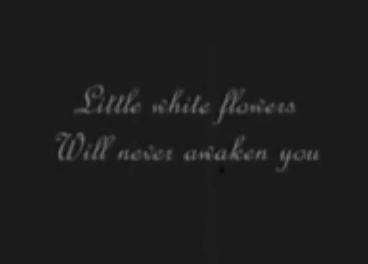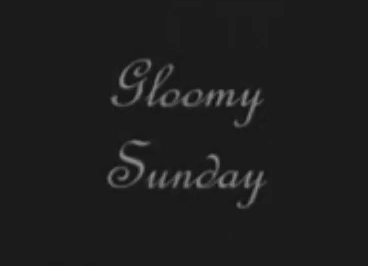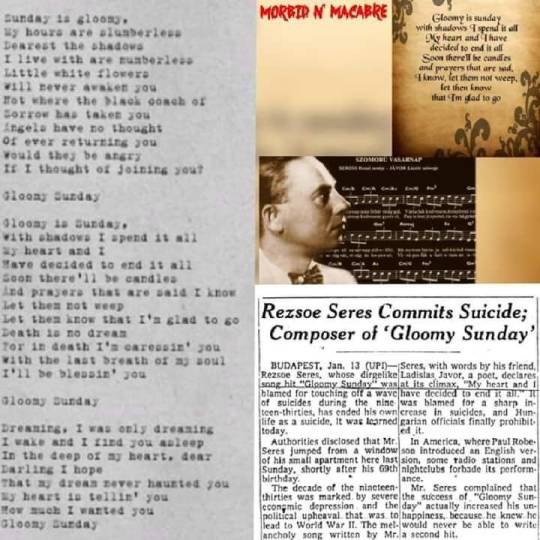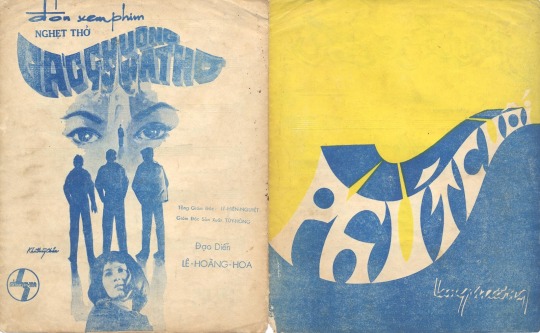#rezso seress
Text
Gloomy Sunday by Rezső Seress.




#Rezső Seress#rezso seress#gloomy sunday#dark aesthetic#darkness#darkness aesthetic#dark#goth#gothic#goth aesthetic#gothic aesthetic#song quotes#song lyrics#song lyric#song quote#Szomorú Vasárnap#sadness#sad day#sunday
2 notes
·
View notes
Video
youtube
Rezso Seress - Gloomy Sunday (with lyrics)
29 notes
·
View notes
Text
Domingo sombrio
O domingo é sombrio As minhas horas sem sono Queridas as inúmeras sombras Com as quais convivo Pequenas flores brancas Não te acordarão Não onde o treinador negro Da dor te levou Os anjos não pensam Em te devolver jamais Será que eles ficariam zangados Se eu me juntasse a ti? Domingo sombrio O domingo é sombrio Passados nas sombras O meu coração e eu Decidimos acabar com tudo Daqui a pouco haverão flores E orações que dizem saber Mas não os deixem chorar Deixem saber O quão feliz estou por partir A morte não é um sonho Pois na morte eu te acaricio Com o último suspiro da minha alma Eu te abençoarei Domingo sombrio Sonhando Eu estava apenas sonhando Acordo e te encontro dormindo No fundo do meu coração Querida, eu espero Que o meu sonho nunca te persiga O meu coração está te dizendo O quanto eu te quero Domingo sombrio Domingo sombrio
1 note
·
View note
Text
Sunday is gloomy, my hours are slumberless.
Dearest, the shadows I live with are numberless.
Little white flowers will never awaken you,
Not where the black coach of sorrow has taken you
Angels have no thought of ever returning you.
Wolud they be angry if I thought of joining you?
Gloomy Sunday
Lagu di atas bukanlah sembarang lagu galau yang biasa didengar dari televisi, radio, atau aplikasi musik. Pada suatu waktu, Gloomy Sunday dituding sebagai pemicu bunuh diri orang-orang di Hungaria dan beberapa negara lainnya.
Dalam “Gloomy Sunday: Did The Hungarian Suicide Song Create a Suicide Epidemic?" (2008) yang terbit di Omega: Journal of Death and Dying (2008), Steven Stack, Karolina Krysinska, dan David Lester menuturkan bahwa melodi lagu ini digubah oleh Rezso Seress, seorang pianis dan komposer yang lahir di Hungaria pada 1889 dengan nama Rudolf Spitzer kelahiran 1889.
Stack dkk., menelisik hubungan antara musik dan bunuh diri dengan mengambil contoh Gloomy Sunday. Mereka menelusuri bagaimana lagu ini menjadi mitos sejak dilarang diputar oleh BBC pada 1941 hingga 2002. Gloomy Sunday praktis jadi salah satu melodi paling terkenal dari era 1930an setelah banyak musisi yang dunia yang menyadur lagu tersebut.
Terakhir, pada 1999, sutradara Jerman Rolf Schuebel merilis film fiksi berjudul Ein Lied von Liebe und Tod ("Lagu Cinta dan Kematian") yang menuturkan kisah seputar penciptaan Gloomy Sunday beserta orang-orang di sekitarnya yang mati tragis. Namun, kisah dan nama-nama karakter dalam film tersebut melenceng jauh dari cerita sebenarnya. Dalam Ein Lied, dikisahkan bahwa Gloomy Sunday digubah seorang pianis restoran bernama Andras Aradi yang jatuh cinta pada pacar bosnya. Setelah lagu itu populer ke seluruh dunia dan memancing gelombang bunuh diri, Andras merasa bersalah dan akhirnya bunuh diri dengan pistol.
Kenyataannya, Seress bunuh diri pada 1968, bukan pada tahun 1940an sebagaimana yang dikisahkan dalam Ein Lied. Seress juga tewas setelah loncat dari jendela apartemennya, alih-alih mati dengan kepala tertembus peluru.
Namun sebetulnya tak banyak yang diketahui tentang komposer Rezso Seress. Menurut keterangan yang digali Stack dkk., Seress adalah seorang Yahudi asal Hungaria yang tinggal di Paris dan mencari penghidupan sebagai pianis dan penulis lagu. Pacarnya yang rewel menuntutnya untuk segera mencari pekerjaan tetap. Tahu permintaannya tidak dipenuhi, ia pun meninggalkan Seress.
Lama setelah berpisah, Seress pun berusaha untuk menemuinya sang mantan kekasih. Tapi, pertemuan itu tidak pernah terjadi sebab pacarnya memutuskan bunuh diri dan meninggalkan secarik kertas bertuliskan “Gloomy Sunday". Ini baru satu versi. Hikayat lainnya menyebutkan bahwa yang bunuh diri adalah pacar Laszlo Javor, kawan Seress, penyair Hungaria, dan penggubah lirik Gloomy Sunday.
Suatu hari Seress duduk di apartemennya yang tengah diguyur hujan. Mendung dan suasana hati yang galau menghasilkan satu komposisi yang hanya dikerjakan dalam waktu 30 menit. Setelah ditolak dua kali oleh sebuah perusahaan rekaman, karya tersebut akhirnya diterima, direkam, dan siap diedarkan pada 1933.
Gloomy Sunday ternyata disukai banyak orang. Lirik lagu ini bahkan disadur ke bahasa Inggris oleh Sam M. Lewis dan Desmod Carter. Dengan batuan Lewis, komposer Amerika Bob Allen merekam lagu ini pada tahun 1936. Pada 1941, Gloomy Sunday kembali dinyanyikan oleh biduan jazz Billie Holiday. Lama setelah itu, Ray Charles, Sinéad O’Connor, Elvis Costello, Sarah McLachlan, Sarah Brightman, Diamanda Galas, grup musik Christian Death, Heather Nova, dan Bjork turut menyanyikan lagu ini.
Stack dkk., mengatakan dampak lagu ini baru terlihat pada 1936, tiga tahun setelah lagu ini dirilis. Pada tahun itu, sebanyak 17 orang dilaporkan bunuh diri setelah mendengarkan rekaman atau melihat pertunjukkan langsung lagu Gloomy Sunday.
Aksi bunuh diri terkait Gloomy Sunday tidak hanya terjadi di Hungaria. Sebanyak 200 orang di sejumlah negara dikabarkan mati setelah atau dalam keadaan mendengarkan lagu ini. Caranya macam-macam, mulai dari loncat dari lantai 7 ketika lagu tersebut diputar, atau menenggelamkan diri di sungai bersama piringan hitam Gloomy Sunday. Stack juga menyebutkan kasus di mana secarik kertas berisi lirik Gloomy Sunday ditemukan di TKP. Ada pula cerita seseorang yang setelah mendengarkan lagu ini langsung berderma kepada pengemis dan loncat ke sungai.
Menurut rumor, kasus-kasus bunuh diri ini menyebabkan Gloomy Sunday dilarang diputar di muka umum di beberapa negara seperti Amerika Serikat, Inggris, dan Perancis. Namun lagi-lagi, itu hanya rumor yang sulit dilacak kebenarannya. Demikian pula berbagai macam kisah bunuh diri terkait Gloomy Sunday. Keduanya sulit dibuktikan kebenarannya, meski BBC telah mengkonfirmasi bahwa lagu tersebut memang pernah dilarang di Inggris.
1 note
·
View note
Text
Gloomy Sunday: The Banned Hungarian Suicide Song.
Gloomy Sunday was written during the Great Depression in 1932-1933 by two Hungarian composers: Rezso Seress wrote the music, and Laszlo Javor wrote the lyrics. Rezso wrote the song with his ex girlfriend in mind. It's said that right after the release of the song, that girlfriend committed suicide, leaving a note behind which simply read "Gloomy Sunday". Years later Reszo followed suit, he killed himself by jumping off a building in Budapest.
It wasn't just these two suicides; it's said that a total of 17 Hungarians committed suicide while/after listening to Gloomy Sunday. Some listened to it live, others a recording; it seemed to have the same effect however you listened to it.
In 1936 people began to connect the songs to the high number of people who killed themselves after, and the song was then banned from being played in Hungary.
Americans heard of the song and decided to remake it in English, including the most popular Billie Holiday version. Her 1941 rendition is breathtaking, but everything this woman sang was remarkable.
Legend has it that the song was outright banned from being played in many countries; the BBC, in fact, only allowed the instrumental version. The station did not lift the ban until 2002.
The English lyrics are a bit different from the Hungarian, many believe they didn't have the same effect. It's argued that no one who listened to the American rendition committed suicide, others beg to differ; they claim that between all of the versions that this haunted song is responsible for 200 deaths worldwide.
Here are the original Hungarian lyrics:
It is autumn and the leaves are falling,
All love has died on earth.
The wind is weeping with sorrowful tears,
My heart will never hope for a new spring again.
My tears and my sorrows are all in vain,
People are heartless, greedy and wicked…
Love has died!
The world has come to its end, hope has ceased to have a meaning,
Cities are wiped out, shrapnel is making music,
Meadows are colored red with human blood,
There are dead people on the streets everywhere.
I will say another quiet prayer:
People are sinners, Lord, they make mistakes…
The world has ended!
*I gotta mention that suicide was not exactly uncommon for Hungarians, especially during this time period. People were starving, it was a depressing time to be alive. They had unusually high suicide rates, so maybe the song didn't have a thing to do with it. I'm also betting that 200 is a rather high estimate, but that is the legend. Whatever the truth is, it's interesting nonetheless.
I'll add the Americanized lyrics in the pics, and here is a link if you'd like to listen to Billie Holiday perform it: https://youtu.be/KUCyjDOlnPU
Now, the original version in Hungarian, if you dare: https://youtu.be/BOkUd4IZHE0


16 notes
·
View notes
Photo

Alright page 2. a lot to say about this one. First off all the heralds now have different colored text so you can tell whose talking.
Faustburg has become quite vibrant in little over a year due to it's citizens being no longer fearful of leaving their homes in case they offend the man child mayor by simply existing. You might be wondering gee what is the curious currency that that Mimikyu is selling snow cones for? That friends is called a grain. Food was an insanely valued resource in the Distortion world due to how hard it was to get it to grow. As such things like grain seed was valuable enough to be considered currency. Naturally during the move to Faustburg they were able to grow plenty of food and thus switched over to a coin based system but still kept the name grain. It replaced CWCville's currency of C and W coins as the exchange rate made way more sense. 1 grain = 1 us cent. So those snow cones are at a steal all things considered.
And we see Pythiawyrm singing the song that is the other half of this comic's name sake. It's such a shame that Gloomy Sunday has such a sad urban legend behind it as it really is a beautiful song. Especially the Billie Holiday cover of it. If you're curious about said urban legend here's a link to the Snopes article on it. https://www.snopes.com/fact-check/gloomy-sunday/
As always hope you enjoy and tell me what you think
sonic owned by sega
pokemon owned by nintendo
Lyrics to gloomy sunday written by Rezso Seress and Laszlo Javor
4 notes
·
View notes
Text
#Blog Post 2. Gloomy Sunday – The Hungarian Suicide Song
Gloomy Sunday (Hungarian: Szomorú vasárnap), also known as the "Hungarian Suicide Song," is a popular song written and published in 1933 by Hungarian pianist and composer Rezső Seress. Rezső Seress composed the song while residing in Paris in an attempt to establish himself in late 1932 as a songwriter. At the time of the Great Depression, Seress wrote the song as a reproach to injustices of man, to pray to God that he may have mercy on the modern world and on those who commit evil. The song was released in late 1933 as sheet music with poet László Jávor's words, inspired by a recent break with his fiancé. Jávor rewrote the lyrics after the first publication of the song, though he is sometimes described as the original writer of his words, according to most sources. His lyrics did not contain any political feelings, but rather regretted the death of a loved one and vowed to meet the lover in the afterlife again. This version of the song has become the best known, and most subsequent rewritings are based on the idea of lost love.
Why it’s called the suicide song?!
It is been called the “Hungarian Suicide song “because many people have been committed suicide on behalf of the song. Before the song was banned, up to 17 suicides were allegedly linked to the song "Gloomy Sunday" in Hungary in some way. These "links" included people who allegedly died after listening to the song (either from a recording or performed by a band), or who were said to have been found dead in their suicide notes with references to "Gloomy Sunday".

It reported that Javor "wrote the song for a former girlfriend," and that she committed suicide shortly after her release and left a note reading "Gloomy Sunday" behind her. Many more suicides continued when it was translated into English. At the scene of his suicide, a Hungarian shoemaker named Joseph Keller left a note quoting some of the Gloomy Sunday lyrics. Several bodies with their hands clutching the sheet music of the song were found in the Danube. Two people shot themselves while listening to a band playing the album, and it was found that others ended their own lives while listening to it. In Hungary, the song was banned. There are many other storeys strewn across the Web about Gloomy Sunday suicides. Another talks about a Viennese woman who drowned while clinging to the song's sheet music. Another storey describes a London woman regularly listening to the song and overdose on drugs. Rezso Seress committed suicide, jumping from a building in Budapest in 1968. That part of the storey also seems to have been embellished, with some sources claiming he was unhappy because after "Gloomy Sunday" he would never have been able to produce another song.

What does the song mean?!
I tried to examine the poem, but the language barrier had to be overcome for that. Therefor I selected the English version of the original song which is in Hungarian. The English version of the song is given below.
Sunday is gloomy, my hours are slumberless
Dearest the shadows I live with are numberless
Little white flowers will never awaken you
Not where the black coach of sorrow has taken you
Angels have no thought of ever returning you
Would they be angry if I thought of joining you?
Gloomy Sunday
Gloomy is Sunday, with shadows I spend it all
My heart and I have decided to end it all
Soon there'll be candles and prayers that are sad I know
Let them not weep let them know that I'm glad to go
Death is no dream for in death I'm caressing you
With the last breath of my soul I'll be blessing you
Gloomy Sunday
Dreaming, I was only dreaming
I wake and I find you asleep in the deep of my heart, here
Darling, I hope that my dream never haunted you
My heart is telling you how much I wanted you
Gloomy Sunday
The meaning of the song is as follows: This Sunday, the singer feels sad, is unable to sleep. Singer tells his love that there is a shadow hanging over all. Not sure whether the flowers which is mentioned in the poem reference something specific, but the black coach of sorrow is a hearse. So clearly his lover is dead. There's no way heaven will allow the return of his lover from the dead. So, if they committed suicide, the singer would be welcome in heaven. This Sunday is so sad the singer has decided to commit suicide. Afterwards there will be a wake / service, but the singer doesn't want people to mourn them because they were happy to join their lover in heaven. Death would be a reality in which they would be together again. Their last words on earth would be about their lover. The last part of the song was later added to placate people protesting the song and after stories of people committing suicide after hearing the song. It weakens the premise and impact of the song stating it was all just a dream - nobody died and nobody will suicide.
Could “Gloomy Sunday” inspire a person to commit suicide?
Did the ‘Hungarian suicide song’ really create a suicide epidemic?” which appeared in Omega: The Journal of Death and Dying in 2008. An article in Time Magazine in March 1936 lists a spate of suicides in Hungary allegedly associated with the song: a shoemaker quoted the song in his suicide note; two people shot themselves while listening to bands; people allegedly drowned in the Danube while holding the sheet music. Until 2002, the song was banned on the BBC and, according to some reports, some outlets in the US refused to play the song, fearing that it might be responsible for these suicides. In 2010, as part of Australia's Mindframe National Media Project, Jane Pirkis and Warwick Blood released "Suicide and the Entertainment Media: A Critical Analysis," funded by the Hunter Institute of Mental Health. The study complements research studies on the potential effects of film, television, music and plays on suicidal behaviour and discusses the methodological problems in many of the studies. Although the review found that, under those criteria, it is still unclear whether certain media pieces or genres could consistently trigger suicides, there are instances where airings of specific media pieces were linked to spikes in suicidal behaviour. Several studies have found that airings of a specific episode of the EastEnders soap opera, some episodes of the medical drama Casualty, and some suicidal TV films followed an upsurge in suicide and suicide attempts using the same techniques as those shown in this series. However, with regard to music, the review notes that the studies have largely failed to provide a temporary link between listening to a piece or music genre and attempting suicide.
References
1. BURKART, G. (2017). We Dare You to Listen to “Gloomy Sunday” — The Song That Kills. [Online] The 13th Floor. Available at: http://www.the13thfloor.tv/2017/05/02/creepypasta-gloomy-sunday-the-song-that-kills/ [Accessed 6 Nov. 2019].
2. City of smile. (2014). [Image] Available at: http://riowang.blogspot.com/2014/09/the-city-of-smile.html [Accessed 6 Nov. 2019].
3. Davis, L. (2013). Could this gloomy song really inspire a person to commit suicide? [Online] io9. Available at: https://io9.gizmodo.com/could-this-gloomy-song-really-inspire-a-person-to-commi-1095934058 [Accessed 6 Nov. 2019].
4. DEMAIN, B. (2011). This Song's a Killer: The Strange Tale of "Gloomy Sunday". [Online] Mentalfloss.com. Available at: https://www.mentalfloss.com/article/28525/songs-killer-strange-tale-gloomy-sunday [Accessed 6 Nov. 2019].
5. En.wikipedia.org. (2019). Gloomy Sunday. [Online] Available at: https://en.wikipedia.org/wiki/Gloomy_Sunday [Accessed 6 Nov. 2019].
6. Gloomy Sunday - The Hungarian Suicide Song. (2013). [video] Available at: https://www.youtube.com/watch?v=55FP1LfkkVQ [Accessed 6 Nov. 2019].
7. LIN, K. (2013). Gloomy Sunday – The Hungarian Suicide Song. [Online] Historic Mysteries. Available at: https://www.historicmysteries.com/gloomy-sunday-suicide-song/ [Accessed 6 Nov. 2019].
8. MIKKELSON, D. (2007). Gloomy Sunday Suicides. [Online] Snopes.com. Available at: https://www.snopes.com/fact-check/gloomy-sunday/ [Accessed 6 Nov. 2019].
9. Morgan, A. (2017). The true meaning of “GLOOMY SUNDAY” [Online] Available at: http://cozyloft.us/blog/the-true-meaning-of-gloomy-sunday/ [Accessed 6 Nov. 2019].
10. SongMeanings. (2004). Billie Holiday - Gloomy Sunday Lyrics | SongMeanings. [Online] Available at: https://songmeanings.com/songs/view/3530822107858522831/ [Accessed 6 Nov. 2019].
11. Terich, J. (2019). How "Gloomy Sunday" came to be known as "The Hungarian Suicide Song". [Online] Treble. Available at: https://www.treblezine.com/gloomy-sunday-hungarian-suicide-song/ [Accessed 6 Nov. 2019].
12. THE GLOOMY SUNDAY. (2019). [Image] Available at: https://www.planethunter.in/2019/06/the-gloomy-sunday.html [Accessed 6 Nov. 2019].
13. Valiente, T. (2019). ‘Gloomy Sunday,’ or the song that kills. [Online] BusinessMirror. Available at: https://businessmirror.com.ph/2019/01/18/gloomy-sunday-or-the-song-that-kills/ [Accessed 6 Nov. 2019].
1 note
·
View note
Text
“Gloomy Sunday”, la canción maldita
“Gloomy Sunday”, la canción maldita
“Gloomy Sunday”, la canción maldita
“Gloomy sunday” es una popular canción escrita en 1933 por el pianista húngaro Rezső Seress, que ha sido versionada por artistas de la talla de Billie Holiday, Sined O’Coonor o Björk.
En un inicio fue nombrada como “Vége a világnak “(El mundo se acaba) aunque posteriormente se remplazo la letra por un poema “Szomorú Vasárnap” (Domingo triste) El tema…
View On WordPress
0 notes
Text
i opened up itunes on shuffle last sunday and the first song that came up was rezso seress’ “gloomy sunday” aka. “the hungarian suicide song”
thanks, itunes
1 note
·
View note
Text
Phút cuối - Núi đồi lồng lộng, chiều mưa nhớ ai…
Phút cuối – Núi đồi lồng lộng, chiều mưa nhớ ai…
… Núi đồi lồng lộng, chiều mưa nhớ ai…(1)
Âm nhạc ảnh hưởng đến cảm xúc của con người là chuyện thường, nhưng cảm xúc đến độ rơi nước mắt là chuyện hiếm. Suýt nữa tôi đã rơi vào tình huống khó coi này chỉ vì nghe một bản nhạc sến. Nhưng nghe nhạc đến rơi lệ vẫn là chuyện nhỏ. Nghe nhạc tới mức tự tử mới là chuyện lớn.
Năm 1932, anh chàng nhạc sĩ người Hungary, Rezso Seress, thất nghiệp, thất…

View On WordPress
0 notes
Note
Ok so, I have a bunch more but here's my faves: "Candy" by Robbie Williams and "3 am" by Eminem for Wil ("3 am" is all kinds of fucked up, jsyk), "The Beautiful People" by Marilyn Monroe and "Gloomy Sunday" by Rezso Seress for Dark, and "Big Bad Wolf" by In This Moment and "City" by Hollywood Undead for Anti! (also, while we're talking about WKM: "do re mi" by Blackbear for Asshole!Mark and Celine and "Tesselate" by AltJ for Will and Celine ;)
I agree 100% with Candy and 3 AM for Wil (I looked up all of the lyrics for 3 AM and yep you right it’s all kinds of f u c k e d)
Beautiful People for Dark was pretty on point! I had to look up Gloomy Sunday and apparently it’s a Hungarian suicide song? It was intense
I really liked the songs for Anti! The line “Even in these chains, you can't stop me” from Big Bad Wolf was scary accurate, and City is a song I can definitely imagine from Anti’s POV
And yes!! I love Do Re Mi, it definitely has a WKM!Mark vibe to it haha! And I really liked the song Tesselate, especially this line: “Three guns and one goes off, one's empty, one's not quick enough. One burn, one red, one grin. Search the graves while the camera spins.”
6 notes
·
View notes
Text
JE WAJUA WIMBO ULIOSABABISHA WATU ZAIDI YA 100 KUJIUA !?

Gloomy Sunday (Jumapili ya Huzuni) ni wimbo uliotungwa na Rezso Seress (Rudi Spitzer), msanii kutoka nchini Hungary mwaka 1933. Reszo alitunga maneno ya wimbo huo na kupiga mwenyewe ala ya huzuni ya wimbo huo, baada ya kuachwa na mpenzi wake.
❇Inaelezwa kwamba kitendo cha kuachwa na mwanamke aliyekuwa akimpenda sana, kilimfanya apatwe na huzuni kali na msongo wa mawazo, na katika kipindi hicho…
View On WordPress
0 notes